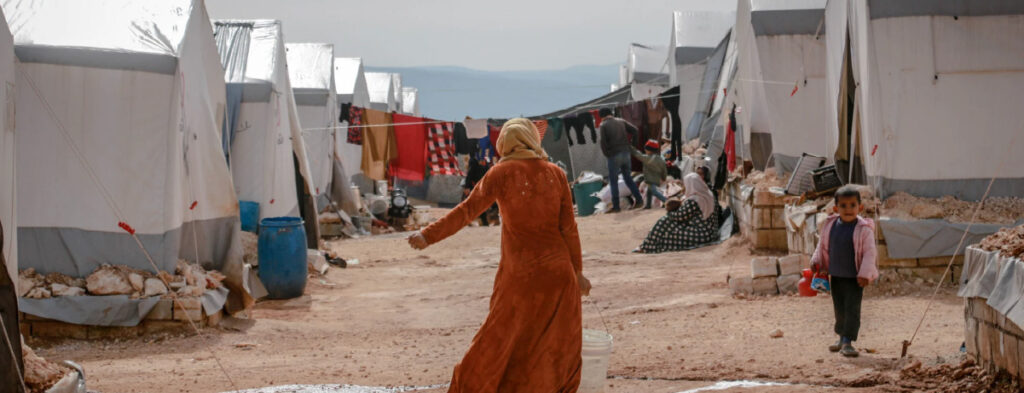The top 50 countries where Christians experience the greatest levels of persecution today include a significant number of countries in the Eurasia region. This year, one third of the region’s 12 countries featured on Open Doors’ World Watch List.
Most of Eurasia once formed part of the communist Soviet Union, and each of the countries have long and challenging histories of economic, social, and religious hardship which extend into the present reality. Less than 0.01 percent of the 292 million people who live in this region are evangelical Christians.
Ministry within the Eurasia region is both complex and dangerous, but God is at work here in special ways. In May 2023 nearly 100 evangelical leaders from countries across the region met together in Bishkek, Kyrgyzstan, for a regional gathering hosted by the Lausanne Movement, as part of the Lausanne 4 journey.
As a guest participant, I was able to join in listening to God’s Word and one another, discussing challenges and opportunities in the region, and considering how the Great Commission may advance in Eurasia through strategic collaboration.
Through the gathering, I saw that effective gospel ministry today in Eurasia is growing in creative and abundant ways. Here are a few of the stories I encountered, as well as specific ways we as the global church can pray.

Uzbekistan: From Garbage Dump to Lighthouse of Hope
30 kilometres outside of the Uzbek capital of Tashkent, a travelling pastor saw an opportunity to uplift both the physical and spiritual environments of a community.
An open space located just a little way away from nearby homes had become a convenient place for people to dispose of their household waste. Over the more than five decades since the mounds of trash first appeared, the local government had not been able to control the waste. Pastor Jacob arrived in the street, now a massive garbage dump, and felt a burden growing in his heart. God was calling him to leave his business and go and serve a community in need.
Jacob and his family decided to plant a church in that very street. They rallied those in the congregation to clean up the garbage as a witness to the surrounding community that they would make a tangible difference in the area. Slowly but surely the dump decreased in size. In their first major cleanup, they filled six trucks with waste and toxic soil.
Before long, they built a children’s playground where the dump once was. Again, this investment in the community was a testimony to the people that the church was present and ready to make a difference.
News of this change made its way to the mayor. Jacob invited him to come to church and hear the gospel. After the service, the mayor asked what the next undertaking for the church would be. Jacob shared that the church had actually wanted to construct a new building to accommodate their recent growth from 90 to more than 250 people, but that government red tape had prevented them from making any progress. The mayor responded more positively than Jacob could have ever imagined: ‘I command you to build it.’
Pray that every one of the nearly six million people in the greater Tashkent metropolitan area would come to hear the gospel and have an opportunity to respond to it.
The church building that now exists has become a lighthouse of gospel-centred hope in the area. God miraculously provided the $300,000 that was needed to see the project to completion. The believers within this local church have witnessed the power of God at work despite facing major opposition at times.
One leader shared with me, ‘To serve people you do not need a lot of money; you need a heart of love and dedication to those around you. We want to share the gospel with our neighbours, but we also want to demonstrate what it means to live the gospel out every day.’
Pastor Jacob and his fellow pastors across the city have a vision that by 2030, a church would be planted in every neighbourhood of Tashkent. So far, 10 churches have been planted.
Pray that God would raise up the human and financial resources that are needed to see this vision fulfilled; that every one of the nearly six million people in the greater Tashkent metropolitan area would come to hear the gospel and have an opportunity to respond to it.

Moldova: Loving Ukrainian Refugees
In the small landlocked country of Moldova, more than 90 percent of the three million people identify themselves as Orthodox Christian, while less than 2 percent of the population are evangelical believers. Yet in the past 18 months, the population has swelled by up to 800,000 people—refugees fleeing Ukraine, which borders the country to the north. While many of these displaced people have gone on to cross into other neighbouring states, more than 100,000 people will continue to call Moldova home for years to come.
Despite being the poorest country in Eastern Europe, half of the churches are known to have rearranged their buildings to accommodate displaced people. Believers have modelled the witness that we can read in the book of Acts, and have generously given of what they have. Holistic mission has been an approach at the forefront of many people’s minds—realising that those fleeing Ukraine need to have their spiritual needs met just as much as their physical needs.
Pray that believers who are responding with hospitality and ministry would have their spirits strengthened, even as their enthusiasm is tempted to wane and resources increasingly become a challenge.
One leader shared with me that a group of ministries that he is a part of has collectively raised more than $1 million in support for those displaced by the war in Ukraine. Together they have also reached upward of 750,000 people and are supporting a number of families in what hopes to be creative and practical ways. For example, one project seeks to distribute seeds for people to set up micro-farming operations, with plans in place to soon include chickens and small livestock. God is using and blessing creative initiatives in Moldova to see the gospel reach those who are most in need at this time.
Pray that believers who are responding with hospitality and ministry would have their spirits strengthened, even as their enthusiasm is tempted to wane and resources increasingly become a challenge. Pray that churches would continue to work together, pooling resources and energy, as a demonstration of their unity and love for God and each other. Pray for peace.
Article
A Seedling Church Plant Grows from the Ukraine War
A Lausanne staff member and her husband share their story of fleeing Belarus and Ukraine, and starting a church plant for refugees in Poland.
Kazakhstan: Meeting Tangible Needs for the Gospel
In Shymkent, the third-largest city in Kazakhstan, a pastor and leader in an international mission organisation seeks to minister to youth and those on the fringes of society. He and his team engage in social ministry, looking to meet the tangible needs of single mothers and orphaned children in particular. They engage in home visits, deliver food and basic medical care parcels, and see if there are any other practical ways to help them.
Once doors are open and rapport is established, the gospel is presented. Sometimes this is after one or two visits; at other times it feels as though a suitable opportunity to bear witness to Christ in word will simply never come. Nevertheless, the love of Christ is on display at all times. The good news of Jesus is indeed very good news, particularly to some of the most broken people who have experienced fatherlessness, grief, the impact of alcoholism—which is commonplace in this community—and even connection with those involved in the occult.
The team dynamic in this ministry is vital. Much time is spent on identifying and developing leaders, all while expending substantial energy on searching for resources, ministry partners, and much-needed financial support. To remain true to the holistic approach that this ministry has embraced, members of the team are tasked with building relationships with local businesses in hope of providing potential job opportunities to those they minister to.
Pray that effective evangelism would lead to effective discipleship.
The team has been encouraged to see their ministry bearing fruit as people come to know and accept Jesus Christ as their saviour. Ministry occurs on a daily basis—in homes, churches, parks, dormitories, and community groups. Wherever people meet, opportunities for ministry abound. A growing number of people are coming to faith particularly through friendship evangelism. This evangelism approach has resulted in natural pathways to discipleship, which in turn fuels churches and other ministries to experience growth as well.
Pray that God would bless the ministry work of this team. Pray that God would strengthen their faith, give them wisdom as they seek appropriate moments to share the gospel of Jesus, and work through them to display the love of Christ to every person that they minister to. Pray that their families would be protected and provided for. Pray that effective evangelism would lead to effective discipleship.
Central Asia: Salt, Yeast, Mustard Seeds, and the Next Generation
One of the most striking takeaways for me in interacting with people at the Eurasia regional gathering was the undeniably strong presence of a significant number of younger leaders, some even as young as 20 years old.
This was not by chance; younger leaders are being intentionally developed and included in various ministry opportunities. One example is a dynamic and growing youth movement, TwoCA, which exists within the countries of Central Asia to see the lives of those ages 14–25 impacted and reached for Christ.
The movement seeks to serve as a platform for ministries to work together to see two percent of teenagers and young adults become evangelical believers in Jesus. They have specifically chosen this target percentage based on author and teacher Ken Braddy’s theory that a culture can be influenced effectively when two percent of people have a shared vision and mission.
Plans exist for the next five years to see youth leaders establish national and regional forums for the sharing of information, resources, and strategic planning through intentional partnerships. A major youth conference, which is expected to draw 3,000 young people from across Central Asia, is planned for August 2023.
Pray that God would stir up a generation of teenagers and young adults who dedicate their lives to faithfully obeying Jesus’ Great Commission.
Four steps guide their action toward the goal of seeing genuine transformation:
- Build relationships with key leaders and ministries in Central Asia. While many are sceptical at first, a number of people have come to be excited about the vision.
- Identify the most relevant issues that people care about and seek to understand the current questions that linger in their minds and hearts.
- Mobilise resources—human, financial, spiritual, and tangible—and invite people into partnerships.
- Establish new initiatives that are contextually relevant and result in genuine community transformation.
In the face of many obstacles, including limited resources and very real challenges to religious freedom, the leaders of TwoCA believe that God is using their bold commitment to the cause of Christ to create a movement that is unstoppable. Realising that big gatherings do not necessarily result in large-scale impact, these leaders are being cautious to prioritise quality engagement over wide yet shallow reach. Jesus’ teachings about salt, yeast, and mustard seeds—all of which are small things that ultimately can result in significant impact—serve as a model for those who are burdened to see a new generation of Christ followers emerge across Central Asia.
Pray that God would continue to work powerfully in and through this youth movement in Central Asia. Pray that the leaders, who are predominately from Kazakhstan, Kyrgyzstan, and Uzbekistan, would work together in beautiful and strategic unity. Pray that God would stir up a generation of teenagers and young adults who dedicate their lives to faithfully obeying Jesus’ Great Commission, making disciples of their families, friends, co-workers, and local communities.
Article
Making Disciples with the Uzbek Bible App
Scripture engagement in the remotest regions of Uzbekistan
Creative Ministry Opportunities
Our brothers and sisters in Christ from Eurasia may well be some of the most resourceful people I have come across. In addition to the stories shared above, at the Bishkek gathering I encountered numerous examples of how Eurasian believers are embarking on many creative ministry opportunities for the sake of the gospel:
Pray that others would be inspired to use the skills, resources, and opportunities that are available to them to glorify God and further His kingdom.
- One church runs a mid-sized venue in a Russian city which has become known as a prime location for events in the area, being fully kitted out with everything that one might need and boasting staff who are known for their attitude of service.
- A group of believers run a well-respected camp counselling ministry that draws people from far and wide in another Eurasian country.
- A Christian drama group uses Mark’s gospel account to perform a 10-minute gospel presentation in an undisclosed Central Asian city.
- A pastor is making headway in establishing healthy churches in a community that specifically seeks to reach out to drug addicts.
- Even more churches are being planted in cities across Ukraine, bringing the hope of the gospel to a people who are broken, hurting, and in dire need of the good news.
- A mission organisation is leading efforts to run a mentoring programme across the region, now going beyond Eurasia with a ministry presence in 26 countries.
- A bi-vocational pastor in Kazakhstan makes and sells transportable barbecues to supplement his ministry funding.
- A young adult leader in Uzbekistan makes and sells more than 100 kilograms of peanut butter each month as a means of supporting himself after leaving his secular job to pursue his calling to serve youth.
Pray that God would bless these creative efforts. Pray that others would be inspired to use the skills, resources, and opportunities that are available to them to glorify God and further His kingdom. Pray that those reached through creative access ministries in every country of Eurasia would come to know and follow Jesus.



